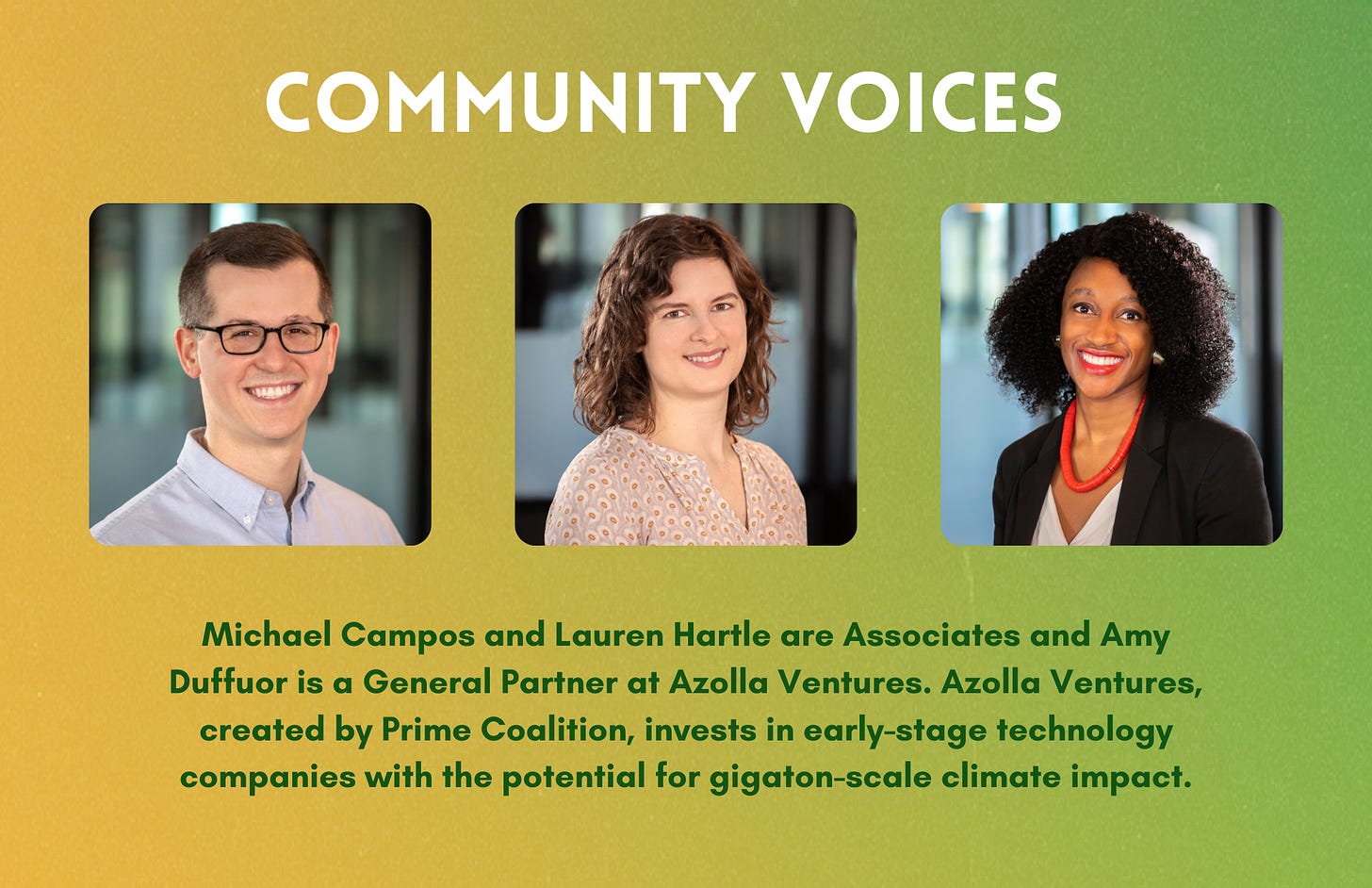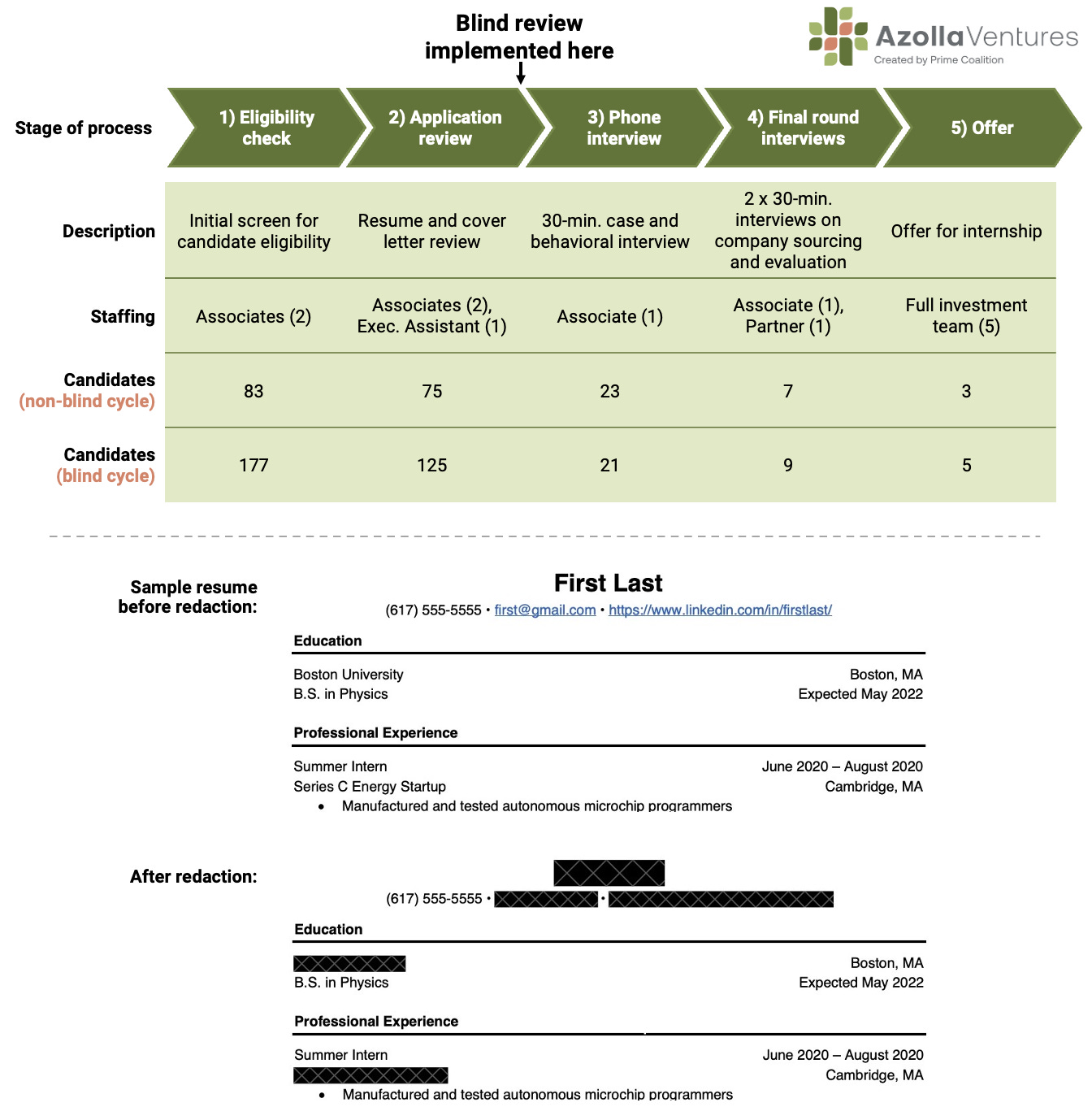Should VCs and startups add blind review to their hiring toolkit?
By Michael Campos, Lauren Hartle, and Amy Duffuor
Should VCs and startups add blind review to their hiring toolkit?
By Michael Campos, Lauren Hartle, and Amy Duffuor
As early-stage venture capitalists, one of our key jobs is talent scouting. Like many in climate tech, we’re grappling with the community’s skewed demographics, including who receives investment, writes checks, and gets carried interest. This is important: as a climate-focused community, we have a responsibility to represent the perspectives of those most affected by climate change. As a startup community, we have an opportunity to diversify teams from the beginning. We’re serious about building a diverse, equitable, and inclusive firm and portfolio; as talent scouts, it’s clear that it’s both the right thing and the smart thing to do.
However, most of our five-member investment team comes from dominant identity groups. We don’t hire new investment team members often, and like many VCs and startups, we don’t have an HR team. It begs the question: how can we put our values into practice?
Blind review: an experiment in bias reduction
We decided to run an experiment in blind review of resumes and cover letters – a tool increasingly utilized to mitigate unconscious bias – to see if it influenced the kinds of candidates we interviewed. We started with our most frequent hires: interns, who work with the investment team on scouting, due diligence, and investment thesis development. We realized that we could launch a “minimum viable product” built on top of a standard application and interview process we already used. From there, we could analyze the results and make iterative improvements.
Overview of the hiring process, and a sample resume before and after redaction.
As shown, we only changed one step in our multi-step process: the selection of candidates for phone interviews. Having run a non-blind process for Spring 2021, we ran a blind process for the Summer. We decided to redact name, email, current school, current company, and other personal information (e.g., LinkedIn, references to candidate’s race/gender). We decided not to redact major, year in school, job titles, past schools and employers, location, phone number, and student group names.
After the dust settled, here’s what we learned
Through blind review, we found that we selected for female- and Asian-identifying candidates, in both absolute terms and relative to the previous non-blind hiring cycle.
Without blinding, we saw virtually no difference in the percent of female-identifying (36% / 35%) and Asian-identifying (29% / 29%) candidates before and after application review. In other words, no clear bias, right? It might be tempting to declare that process bias-free, but if it were so, you’d also expect no change upon implementing blind review.
Instead, when we implemented blind review, we saw a large change. The interviewee pool ended up 18% more female-identifying (44% / 62%) and 20% more Asian-identifying (28% / 48%) than the applicant pool. Representation in our interviewee pool now far exceeded benchmarks in VC and the US overall. While there are likely many factors at play, this finding is generally consistent with research showing that employers tend to discriminate along axes of gender, race, and nationality during resume review. We looked at other dimensions as well (racial, ethnic, and gender identities, first-generation college students, and university rank) but either didn’t see significant changes or didn’t have enough candidates to make meaningful conclusions. We’ll come back to this second point.
Three lessons we’ve learned
First: given this significant change, it’s indeed likely that there was unconscious bias in our process, even though we hadn’t seen red flags beforehand. We know we all have biases, but observing it directly hit home. Second: there is indeed room to iterate! While redacting most information was straightforward, there’s nuance in some categories – for example, location, which has practical benefits and drawbacks. Third: doing a thorough job of resume and cover letter redaction requires time and money. While we hope to continue streamlining our process, at its core, finding great candidates takes time. People are the greatest asset of any startup or VC firm; we think the time is worth it.
Two issues we haven’t solved
It’s important to emphasize that this is a work in progress. Through discussions with DE&I experts at the Adaway Group and others, it’s become clear that while there are concrete improvements most teams can make, best practice is evolving. This is natural for a movement gaining momentum in the corporate world. Moving forward, two areas for improvement are top of mind for us.
First, we need to do a better job at attracting underrepresented candidates in the first place. For example, Black and Hispanic/Latinx candidates were each only 4-8% of our applicant pools. In the near term, we’re intentionally correcting for part of this gap by hiring through the Black Venture Capital Consortium and creating a BIPOC-identifying Entrepreneur in Residence Fellowship. For the longer term, we’re taking steps to widen the top of the funnel beyond our own networks.
Second, blind review optimizes for equality but not equity: it applies the same treatment to all candidates but fails to recognize differences in starting points. It could even strip out important information that could bring an advantageous perspective. To highlight an example from outside climate: Kirsten Green of Forerunner Ventures led the 2014 seed round for a beauty startup called Glossier, now valued at $1.8B. As one of few female checkwriters in e-commerce at the time, she intuitively “got it” where many male VCs passed. If you wanted to find the next Kirsten Green, it’s hard to argue you’d want an identity-blind process.
Conclusion: consider expanding your hiring toolkit
Our experiment here is just one trial, done imperfectly by a busy team. We’re sure there are many issues we haven’t yet considered. Zooming out, there are myriad ways in which climate tech VCs and startups can reduce bias in hiring. Startups might re-evaluate the need for physical requirements in job descriptions where possible. VCs should publicize openings, which is a simple step that hasn’t always been the norm. Both might consider utilizing gender decoders and optimizing for ADA compliance. And inclusion of course doesn’t stop with hiring.
At the end of the day, we want to show other well-meaning teams that reducing bias in hiring is doable. We’ve started our journey, and we hope that sharing our process will make it easier for others. If you have ideas, experiences, or questions to share, drop us a line! We’d love to hear from you.
--
Special thanks to Wendy Hernandez, Prime Coalition’s Executive Assistant, whose time and effort made resume and cover letter redaction possible. Special thanks as well to Mark Barnett of Foley Hoag LLP, who helped us design demographic questions on our application form to comply with best practices in labor regulation.
🎙Startup Series
Two start-up series episodes have gone live in the last couple of weeks. First off, Tessa Clarke, Co-Founder & CEO of OLIO. OLIO is a free app that exists to tackle the enormous problem of waste in our homes & local communities.
Second, Jason sat down with Marion Verles, Co-Founder & CEO of SustainCERT, the leading global carbon emissions accounting and verification platform for carbon markets and corporate value chains.
✨Highlights
Community News
🎙MCJ will be hosting a LIVE podcast recording this week! We’re flipping the script and Jason will be in the guest seat. Jason will be interviewed by our very own, Cody Simms to talk about the last three years, what Jason’s learned on his climate journey, and reflect on where MCJ might go in the future. We will take live questions from the audience. Join #codyxjason-live for more information about the event!
Climate Jobs
For more open positions, check out the #climatejobs channel in MCJ Slack.
Patch is looking for a Communications Lead and Product Marketing Manager
Sustaera is looking to add chemical/process/mechanical/electrical engineers, materials scientists, chemists, and anyone who is passionate about climate tech to the team
Aspiration is hiring a Carbon & Reforestation Portfolio Manager
MightyFly is hiring for a few positions on the hardware side including Head of Hardware, a Build Technician, and a Power Electronics Engineer (Bay Area based)
BiodiversityCo Ltd is looking for a Data Scientist, a Mathematical Ecologist, and a Physicist/Computer Scientist
Stem is hiring a Data Scientist / Model Predictive Control & Simulations
LS Energy Solutions, an energy storage startup, is looking for a Director of Commercial Operations and a Sales Engineer
JERA is looking for a Renewable Development and Finance Associate, a great opportunity for people with a few years of experience in renewable development/finance
ARPA-E is hiring their next round of fellows
Willow is looking for a Founding Soil Scientist
Myst, a Google-backed AI platform accelerating the transition to carbon-free electricity, is looking for people in Product Marketing, Technical Solutions, and Business Development
Reel is looking for (senior) Elixir developers
Climate Events
For more community events, check out the #events channel in Slack or the MCJ Calendar on Luma.
Women in Climate Take Action (Thursday, 1/6 at 12 pm ET)
Climate Changemakers and Women in Climate Meetup are teaming up to host their own Hour of Action with a zoom full of women working in, or passionate about, solving climate change. (You do not need to be an MCJ member to attend) RSVP here!
This Week in MCJ is a free weekly email curating news, jobs, MCJ episodes, and other noteworthy happenings in the MCJ community.
💭If you have feedback or items you’d like to include, feel free to reach out.
📨If someone forwarded this to you, sign up!




